DENVER — Public health officials know people have questions about the Johnson & Johnson vaccine.
While experts in Colorado are excited it's coming online, they also know some of the data on the vaccine has been lost in translation.
We talked to four local health systems -- HealthOne, Denver Health, SCL Health and UCHealth -- and they all said the same thing: the Johnson & Johnson vaccine is very effective in the fight against COVID-19.
Explaining the data
"They are medically equivalent. I promise they are medically equivalent," Dr. Richard Zane, chief innovation officer with UCHealth, said of the Johnson & Johnson vaccine and the others on the market.
Though he also gets why, at first look, that might seem confusing when this vaccine is compared to the ones from Pfizer and Moderna.
"It's hard not to ask questions when you read that Pfizer and Moderna [are] at 94, 95 percent [efficacy]," Zane said.
Johnson & Johson's vaccine has been widely reported to have a 66% efficacy rate, but according to Zane, the vaccines can't truly be judged on just a surface level.
Looking at them requires a deeper dive into the numbers, and when it comes to ending the pandemic, experts like Zane are focusing on the factors that matter most.
"The most important [are] severe disease, hospitalizations and death," he said. "They are all equivalent and excellent vaccines."
So why the number discrepancy?
Every doctor we talked to said you can't make a direct comparison between the three vaccines.
Dr. Holly Monatt with HealthOne said it's important to look at the contrasting studies.
"Each vaccine trial took place during different times of the year, and in different geographic regions," Monatt said.
Then there's this point from Dr. Connie Price with Denver Health:
"When Johnson & Johnson were doing their phase three trials, we had in circulation a lot more of these variant strains," she said.
"There are some differences reported for equivalency for mild disease," added Zane. "Again that's the difference for mild disease. They were studied at different times and different parts of the world."
Also, Zane said, mild symptoms are easier to handle.
When the doctors looked at how each individual vaccine worked for the important factors, like saving lives and keeping people out of hospitals, these doctors said all three vaccines worked really well.
"Because developing a vaccine in a year during a pandemic was a historic and momentous scientific achievement, we wanted to report that they were 94 percent effective. Then when trials came out for Johnson & Johnson, just the fact that it was different made the news, and unfortunately, the news was not contextual," Zane said.
Vaccine availability
In general, the hospital systems we talked to Thursday said people cannot pick and choose which vaccines they are receiving right now. It's based on availability.
Denver Health said it has one type of vaccine at each clinic to avoid any mix-ups. They want people to find appointments based on appointment availability and accessibility to the vaccine sites.
The Colorado Department of Public Health and Environment said:
"Coloradans will know what vaccine is at a site or clinic when setting up an appointment.
The state is very pleased to have another life-saving and crisis-ending vaccine to help us in the fight against COVID-19 to help end this pandemic. None of the currently authorized vaccines is currently recommended over any other. All three vaccines are safe and work well to prevent moderate to severe COVID-19 disease.
Coloradans are encouraged to schedule an appointment and get vaccinated when they are eligible regardless of which vaccine their provider is offering."
Johnson & Johnson's is a one-dose vaccine and easier to store.
RELATED: Archdiocese of Denver advises Catholics to pick Moderna, Pfizer vaccines over Johnson & Johnson
SUGGESTED VIDEOS: Full Episodes of Next with Kyle Clark

